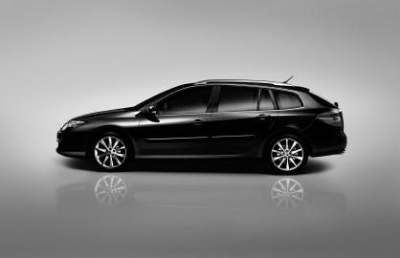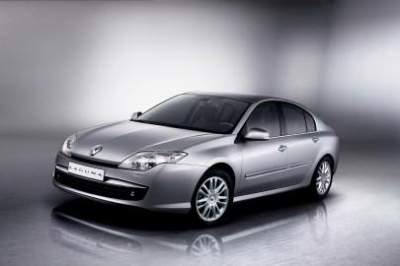|
| |||||
|
New Renault Laguna Coming For 2008
25th June, 2007 | ||||
|
With a style inspired by a desire to achieve a dynamic, fluid and elegant appearance, new Laguna also boasts high quality levels, in keeping with its target of being in the top three in its segment for product quality, as outlined in Renault Commitment 2009. Everything about the new Laguna has been designed for genuine driving pleasure, combining outstanding ride quality and comfort with top-class handling performance. Among its key features are an impressively light chassis, precise steering and a wide range of engines and gearboxes, offering the perfect blend of high performance and fuel economy. The comprehensive engine line-up in new Laguna offers power between 110 hp and 175 hp, including three new engines: 1.5 dCi 110, 2.0 dCi 130 and 2.0 16V 140. With the 2.0 dCi 150 mated to the new Renault-Nissan Alliance six-speed automatic gearbox, which has already received considerable acclaim from the media in the Mégane range, it is both flexible and efficient. The new economical and ecological 1.5 dCi 110 version of new Laguna, offers the finest possible balance between emissions, fuel economy and performance in its segment with 55.4 mpg on a combined cycle and only 136 grammes of CO2 per km. Completing the additions, is the new smooth and responsive 140 hp two-litre 16V petrol engine, developed jointly again by Renault and Nissan, which runs silently under the bonnet of the new Laguna. With high active and passive safety levels, including a new generation double side airbag (thorax and pelvis), supreme on-board comfort levels and unrivalled ease-of-use, new Laguna affords peace of mind to all of its occupants. Quality and durability from the outset New Laguna is fundamental to the company’s quality ambitions outlined in Renault Commitment 2009: to be ranked in the top three in its segment for both product and service quality. Ensuring that the new Laguna is robust and reliable throughout its lifecycle, in addition to more stringent design and manufacturing processes, more than 120 new Lagunas have been put through the equivalent of 6 million kilometres of testing under the most demanding climatic and road conditions, from the dust and extreme heat of the Australian outback to the humidity and dirt tracks of Malaysia. New Laguna dCi 110 also forms part of Renault's new ‘eco²’ environmental initiative, which clearly identifies economical and ecologically sound vehicles. To minimise its impact on the environment, the new Laguna reuses 35 kg of recycled plastics in manufacturing, while to optimise fuel consumption, it also now an average of 15 kg lighter than the model it replaces. Beauty is more than just skin deep The new Laguna boasts a dynamic, elegant and streamlined exterior. The close attention paid to the quality of materials used and the standard of fit and finish bears witness to the considerable amount of work carried out in terms of quality, for its exterior and interior design. New Laguna has a style which emphasises its dynamism and driving pleasure-oriented nature. The front end, with its streamlined optical headlights, a long, sloping bonnet and a generous air intake grille, hint at the presence of a powerful engine. At 4.69m long, New Laguna’s proportions are naturally balanced for a more dynamic appearance. Offering a capacious interior, the Hatch is 36 mm than its predecessor, as well as 10 mm longer and 12 mm taller. The plunging shoulder line running along the side of the car lends its own specific character and elegance, while the chrome trim on the side windows (Dynamique versions and above) gives the vehicle an extra touch of class. The lower part of the car, with its distinctive sills, rests solidly on 16 to 18 inch alloy wheels (depending on model). On the Hatch, the crease line extends along the boot, just below the rear LED sidelights, which give the car a distinctive rear profile at night. On the more high-performance versions, two chrome-plated exhaust pipes hint at the power concealed beneath the bonnet. Sport Tourer: An expressive and distinctive estate 
Dynamic and modern, the dramatic slope of the rear screen on the Sport Tourer lends it a striking air. The third side window, with its extended glazed surface, accentuates the dynamic shape of the new Laguna. Practicality remains a priority, with numerous new storage innovations, including the new ‘Superfold’ system for the rear seats which offers a perfectly flat load area. A fitting interior New Laguna’s interior is perfectly in tune with its exterior. Following the quality gains made with recent Renault models such as Modus and Clio III, a refined finish, high-grade materials and quality prevail throughout, so that the new arrival’s interior design provides a welcoming environment for all its occupants. The dashboard accentuates its top-of-the-range feel, with the design and positioning of all the controls and displays having been ergonomically tailored to the driver’s needs. Depending on trim level, the central console includes the main controls for the cruise control and speed limiter, as well as those for the two multimedia satellite navigation systems available, both with integrated Bluetooth hands-free phone kits. New Laguna is also available with Renault’s innovative multi-functional TunePoint system which allows portable audio systems and USB keys to be plugged in. In terms of interior style, the Initiale trim level has been designed to satisfy the most demanding of tastes with its contemporary wood and leather finishes, with a choice of charcoal grey or light beige upholstery. On the Dynamique S, alcantara and leather seats with reinforced lateral support complement the sporty charcoal grey interior, metallic finish and F1-style flat-section steering wheel. Driving pleasure Everything about New Laguna has been designed with genuine driving pleasure in mind, combining outstanding ride quality with top-class handling. Developed to surpass the handling qualities of its predecessor, the New Laguna’s chassis will be appreciated for the precision of its steering and its capacity for cornering without roll. Renault engineers have put enormous effort into ensuring accurate steering and optimum chassis stability. The development of New Laguna focused on controlling body-roll, with stiffeners increased by 20% and 50% respectively on the front and rear suspension, and a correspondingly more effective anti-roll bar at the rear. New Laguna benefits from more tightly geared steering for greater driving pleasure through the bends, and now deals with rough road surfaces better than ever, so that the driver feels firmly in contact with the road at all times. New Laguna remains among the best in terms of comfort and safety too, while keeping vehicle weight impressively low: it is the first Renault vehicle to be lighter than its predecessor, shedding an average of 15 kg across all versions. Impressive range of engines and gearboxes New Laguna is available with a wide range of engines, all coupled to six-speed gearboxes for exceptional driving comfort and reduced fuel consumption. The petrol range will appear on the market gradually, starting with the dynamic, smooth and silent 140 hp two-litre 16V engine (M4R). With verve and torque even at the lowest engine speeds, power at high speed and smooth soundproofing at all times, this engine, provides impressive acoustic performance and driving comfort. The 170 hp two-litre 16V Turbo petrol engine with its six-speed pro-active gearbox completes the petrol range. The diesel range is based around Renault’s highly acclaimed 1.5 and 2.0 dCi engines. The former offers the best balance between performance and fuel consumption in this segment, with special eco-leader status (136 grammes CO2 /km). Then, there is the 2.0 dCi, which is available in three different versions: 130, 150 and 175 hp, and for the first time, will feature a six-speed proactive automatic gearbox on the 150 hp version. New engines will be added gradually after launch, to give one of the most comprehensive line-ups in the upper-medium class. As part of Renault Commitment 2009, New Laguna will make a major contribution to Renault’s ‘eco²’ environmental initiative with engines which are already designed to comply with the forthcoming Euro5 standard. The first of these at launch will be the 2.0 dCi 175 FAP (particulate filter). Serenity and peace of mind New Laguna will afford peace of mind to all its occupants, offering the best comfort and safety levels in its category, in addition to first-class thermal comfort. It has also benefited from careful attention to acoustics, making it exemplary in its segment, especially the diesel versions. The very best of Renault expertise in active and passive safety Like its forebear, Laguna II, which was the first car to ever achieve the maximum five-star Euro NCAP crash test rating, new Laguna benefits from Renault’s acclaimed expertise in active and passive safety. In addition to the outstanding handling afforded by the chassis, new Laguna’s braking performance is one of the best in its category, particularly in tests to check for braking endurance under hot conditions (total stopping distance measured over 10 consecutive brake stops from 62 to 0 mph). New Laguna’s braking system will also be one of the most fade resistant on the market. New generation ABS technology with ESP (Electronic Stability Programme) and EBA (Electronic Brake Assist) comes as standard. In the domain of passive safety, Renault has developed solutions which take into account accident research and real-world behaviour, adopting an all-encompassing approach to achieve more effective occupant safety. Consequently, the new Laguna is equipped with latest generation features, including double-chamber and double-pressure airbags combined with dual pre-tensioner seat belts. However, the most impressive progress has been made in protection against side impacts, a major cause of accident fatalities. To guarantee better occupant safety in the event of a side impact, the electronic architecture of the vehicle has been enhanced to ensure that its protective systems are triggered sooner. Using a device based on two sensors located in the front door and the centre pillar, a specific algorithm adjusts the release time according to the violence of the impact. In addition to this device, a new generation double side airbag (thorax and pelvis) has also been fitted. Exceptional comfort and ease-of-use Three factors combine to make the new Laguna the quietest cabin in its class, due largely to more effective insulation between the engine compartment and the cabin: treatment of engine noise levels, especially at low engine speeds and insulation against general road noise and aerodynamic noise generated at high speed. New Laguna is the first Renault to benefit from the knowledge gained from the specific customer surveys relating to thermal comfort conducted in recent years. Better knowledge of customer expectations, and the development, in conjunction with Nissan, of a new air-conditioning unit for the American market, mean Renault are well-placed to offer one of the best solutions in the class. In addition, the adoption of an externally-controlled high-capacity compressor means that cool air can be produced rapidly, while still only using air-conditioning as necessary, to manage consumption. In markets where it has undergone assessment, new Laguna’s air conditioning system ranks as one of the best systems available. In terms of heating, temperature can be increased more rapidly thanks to powerful electrical resistors used on the diesel versions. The air conditioning controls are automated with an innovative and easy-to-use new "Soft-Auto-Fast" triple-action system. It is now easier than ever to read information on the instrument panel, with extensive attention paid to cockpit ergonomics. In practical terms, this means a New Laguna which is now easier to use day-in day-out thanks to its power-assisted parking brake and second generation hands-free card for the ignition and door opening and closing (depending on model). The Sport Tourer also features a new ‘Superfold’ system which allows the rear seats to fold completely flat at the touch of a button. Reliability and robustness: quality in the genes Designed with quality in mind, new Laguna has been designed from the outset to be robust and reliable, with the stated objective to be ranked in the top three in its segment for both product and service quality. New Laguna now has to sustain and secure the tangible progress in quality made with recent Renault vehicles, not only in the design and testing phases, but also in manufacturing and servicing throughout the vehicle’s lifetime. Four phases in the development of New Laguna were subject to particularly close scrutiny: Design: The functional tests, which have already proved successful for Modus and Clio, were increased with new Laguna. Three electronic integration platforms, reproducing the electrical and electronic architecture of the vehicle, allowed all possible combinations to be simulated, ensuring function without failure. New Laguna is also the first vehicle to have been put through its paces, at Renault’s EMC (Electro-Magnetic Compatibility) unit, unveiled at the Aubevoye Technical Centre in early 2006. The car’s robust design also takes maintenance and repair requirements into account. Testing: With analysis conducted on the test bench, out on the circuit and the open road, more than 120 new Lagunas were put through their paces over a total equivalent of more than 6 million kilometres of testing. New Laguna has already been driven on roads all over the world, to evaluate its behaviour in extreme environments from as far afield as Argentina, Australia, Malaysia and Russia. During this demanding test programme, the cars tackled severe climatic conditions and conditions of use: altitude, dust, extreme heat and cold, humidity, mud, poor roads and very high speeds. Manufacturing: In its industrial processes, Renault puts all of its efforts into delivering the results it has committed to. There were discussions very early on about best practices in Renault and Nissan plants in particular, which included benchmarking exercises at some of the key factories for each company. These included Renault’s factories in Valladolid, Spain and Flins, France, home to Clio III and Modus respectively, in addition to Nissan’s factories in Sunderland factory its luxury car plant in Tochigi, Japan. This meant the company was able to introduce more control and efficiency into assembly processes throughout the manufacturing process at the plant where wew Laguna is produced in Sandouville, France: optimising operating stations and reconfiguring flows, making inspections more stringent, ensuring the vehicles are more effectively protected. Static and dynamic tests, as well as electronic diagnostics are performed on every vehicle that leaves the plant. Servicing: Work on new Laguna does not end as soon as it leaves the plant. Since the very first digital mock-ups, vehicle maintenance and repairability have been kept in mind. Prototype workshops, for testing diagnostics tools and repair methods, were developed and tested. Staff training programmes are already underway, for example, in the use of the Alliance CLIP (diagnostic tool) set, which will be extended throughout the worldwide network. Another initiative in this area is specific sales and technical training, carried out via e-learning. The quality of service has already improved, rising in 2006 from 71% to 75% of customers who say they were satisfied or very satisfied. New Laguna will reap the benefits of the implementation of the Renault Quality Excellence Plan (PER4), the aim of which is to ensure customer satisfaction at the time of sale and throughout the after-sales phase. Low running costs guaranteed New Laguna is designed to be competitive in terms of running costs. It ranks as one of the best in its segment, with attractive running, maintenance and repair costs, which are kept to a minimum thanks to its 110 hp and 150 hp dCi engines in particular. Attractive purchase, running and maintenance costs for all customer groups was the target for Renault’s engineers and testing team. The concept of Total Cost of Ownership was considered most relevant, because it includes all the financial factors linked to owning a vehicle (depreciation and residual value), running it (e.g. fuel and duties), and finally, scheduled maintenance (tyre wear, servicing etc.). When it comes to residual value, which is linked to the quality of the product and its image, new Laguna already has several points in its favour, in terms of its inherent quality and driveability. As for running costs, new Laguna will be highly competitive, as its running and repair costs have been studied very carefully, to optimise both the frequency and length of repair times. 1.5 dCi engine: indisputable market eco-leader The new 110 hp diesel engine in new Laguna sips fuel at a rate of just 55.4 mpg (with emissions of 136 grammes CO2 per kilometre), while its oil change interval has increased to 18,000 miles due to its new OCS (Oil Control System) which debuts across the range. This powerful yet economical engine is suitable for tough use, particularly high mileage customers. 2.0 dCi engine: the pinnacle of performance, reliability and economy A leader in performance and driving pleasure, the 2.0 dCi 150 hp engine has been specifically adapted to the performance characteristics of the new Laguna chassis. Given how the vehicle performs, its fuel consumption is very competitive, with the Hatch offering 47 mpg combined and less than 158 grammes of CO2 per kilometre. Designed to respect the environment The Renault ‘eco²’ initiative is a sign of Renault’s work to protect the environment, designating the vehicles which meet a specified set of both ecological and economical criteria: manufactured in an ISO 14001- certified plant, with CO2 emissions of less than 140 g/km (or running on E85 bioethanol or B30 biodiesel, and with at least 5% of plastics used sourced from recycling. The 110 hp diesel version of new Laguna meets all the conditions required to receive the Renault ‘eco²’ label. It has been designed to comply with quotas of 85% recyclability and 95% recovery by 2015, using more than 35 kg of recycled plastic and more than 15 kg of renewable materials. New Laguna makes its debut at the Frankfurt Motor Show in September. Australian availability has not yet been announced. | |||||
ABN 47106248033 |
 |
All rights reserved. |
